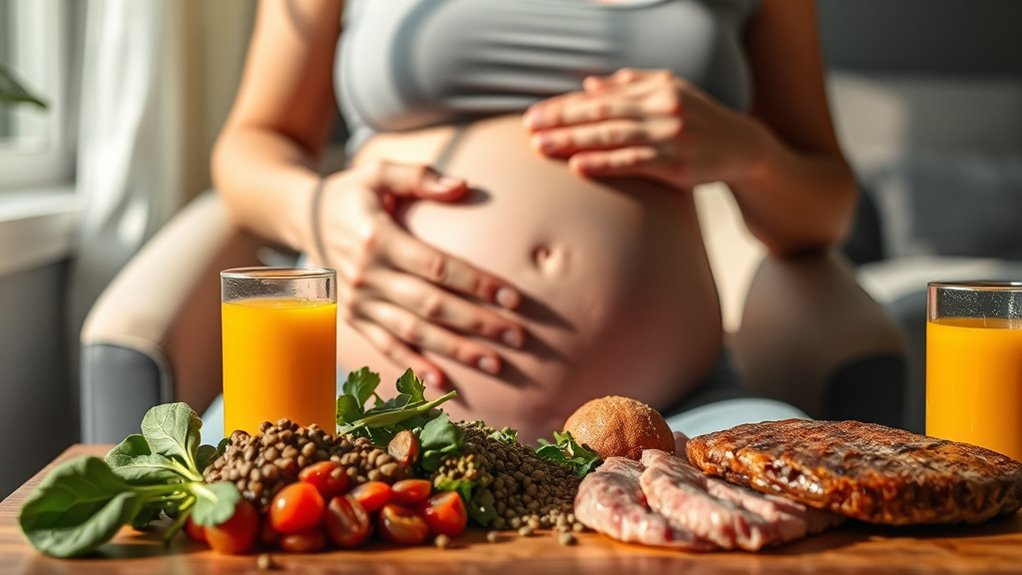Anemia during pregnancy can make you feel fatigued and weak. You might experience dizziness, breathlessness, and pale skin. It’s often caused by iron deficiency, especially as your blood volume increases. To combat this, take iron supplements and eat iron-rich foods like leafy greens and lean meats. Plus, ensure you’re getting enough folate and vitamin B12. Addressing anemia is vital for both you and your baby, and there’s more you should know to stay healthy.
Key Takeaways
- Common symptoms of anemia in pregnancy include fatigue, weakness, dizziness, pale skin, and rapid heartbeat.
- Diagnosis typically involves hemoglobin and hematocrit tests during prenatal visits.
- Iron deficiency is a leading cause, necessitating increased iron-rich food intake.
- Iron supplements and prenatal vitamins with iron and folic acid are essential for treatment.
- Ignoring anemia can result in serious complications for both the mother and baby.

Anemia during pregnancy is a common concern that affects millions of women worldwide, particularly in developing countries where the prevalence can reach up to 51%. You mightn’t realize it, but approximately 36.8% of pregnant women globally face this issue. The numbers can be even higher in the third trimester, reaching 48.8%. Factors like low income, late antenatal booking, and low educational levels can increase your risk.
If left unmanaged, anemia can lead to serious health complications for both you and your baby.
Iron deficiency is one of the primary causes of anemia during pregnancy, impacting up to 52% of pregnant women in developing countries. As your blood volume increases during pregnancy, your body requires more iron and nutrients. If you’re not getting enough iron-rich foods in your diet, this can exacerbate the problem.
Alongside iron, deficiencies in vitamins like folate and B12 can also contribute to anemia, making it crucial for you to monitor your nutrient intake.
Symptoms of anemia can be quite distressing. You might feel fatigued and weak, experiencing dizziness or breathlessness. Pale skin, lips, and nails can also be visible signs. If you notice a rapid heartbeat or struggle to concentrate, these could be indicators that you’re dealing with anemia.
Recognizing these symptoms early is vital, as it could prompt you to seek medical advice sooner.
Diagnosis typically involves a hemoglobin test that measures your hemoglobin levels, along with a hematocrit test to determine the percentage of red blood cells in your blood. A complete blood count (CBC) is often done during your first prenatal visit and repeated later in your pregnancy.
If your test results show low hemoglobin or hematocrit levels, it’s a clear sign of anemia.
Fortunately, treatment options are available. Iron supplements are commonly prescribed to address iron-deficiency anemia, along with prenatal vitamins that contain iron and folic acid. You should also focus on dietary changes, increasing your intake of iron-rich foods like spinach, lean meats, and beans.
If you have a vitamin B12 deficiency, your doctor may suggest supplements to help.
Ignoring anemia can lead to significant complications, including risks of heart failure for you and low birth weight or developmental issues for your baby. By staying aware of your symptoms and seeking appropriate treatment, you can protect your health and your baby’s wellbeing throughout your pregnancy.
Frequently Asked Questions
Can Anemia in Pregnancy Affect the Baby’s Development?
Yes, anemia during pregnancy can affect your baby’s development.
It increases the risk of neurodevelopmental disorders and can lead to preterm birth or low birth weight.
If you have anemia, your baby’s cognitive and motor skills might also suffer, potentially causing long-term developmental delays.
Early detection and treatment are crucial to minimize these risks, so regular prenatal care is essential for both your health and your baby’s wellbeing.
Is Anemia More Common in Certain Types of Pregnancies?
Yes, anemia is more common in certain types of pregnancies.
If you’re expecting multiples, your nutritional demands increase, raising your risk of anemia.
Close successive pregnancies can also contribute, as your body mightn’t have enough time to replenish nutrients.
Additionally, if you’ve experienced heavy menstrual flow before pregnancy or are a teenager, you might be at a higher risk.
Recognizing these factors can help you take proactive steps to manage your health.
How Can I Prevent Anemia During Pregnancy?
To prevent anemia during pregnancy, you’ll want to boost your iron intake to 27 milligrams daily. Incorporate iron-rich foods like lean meats, leafy greens, and beans into your diet.
Pair these with vitamin C sources, like citrus fruits, to enhance absorption. Take prenatal vitamins with iron and folic acid, and stay on top of your regular check-ups.
Maintaining a balanced diet and managing previous health issues also plays a crucial role.
Are There Any Specific Foods to Avoid?
When managing anemia, you should avoid certain foods that can hinder iron absorption.
Steer clear of calcium-rich foods and dairy products during meals, as they can block iron uptake.
Limit coffee and tea, too, since they can reduce how much iron your body absorbs.
High-fiber foods are great but should be balanced with vitamin C.
Lastly, skip raw or undercooked foods to prevent infections that could complicate your health.
When Should I Seek Immediate Medical Attention for Anemia?
Did you know that anemia affects up to 37% of pregnancies worldwide?
If you experience severe fatigue, rapid heartbeat, or shortness of breath that worsens, it’s crucial to seek immediate medical attention.
Additionally, if you notice significant blood loss or signs of fetal distress, don’t hesitate to get help.
Remember, early intervention can prevent complications and ensure both your health and your baby’s well-being.
Trust your instincts and prioritize your care.
Conclusion
In the journey of pregnancy, don’t let anemia dim your glow. Recognizing the symptoms early and taking proactive steps can ensure both you and your baby thrive. Much like a knight equipping themselves for battle, arming yourself with iron-rich foods and supplements can make all the difference. By prioritizing your health, you’re not just nurturing a little one; you’re also embracing the vibrant adventure of motherhood. Remember, every step towards wellness is a step towards a brighter future.









